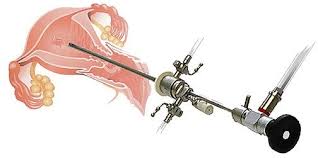Hysteroscopy
Hysteroscopy
Hysteroscopy is an essential step if you are undergoing any fertility evaluation or looking for an IVF. Hysteroscopy helps to diagnose and treat the problems associated with your uterus. During unsuccessful IVF attempts, hysteroscopy is advised to determine underlying issues related to the uterus. It allows your doctor to diagnose the intrauterine pathology and decide the best line of treatment.During IVF, it is essential to check for any intrauterine defect that can interfere with the implantation. Hysteroscopy enables better evaluation of any such issues and also improves your chances of conception.
What is Hysteroscopy
Hysteroscopy is a procedure that enables the surgeon to view the internal structures of your uterine cavity without the need for an incision. The uterine cavity is examined for any intrauterine pathology and opening of fallopian tubes. Removal of polyps or taking a biopsy sample is done during a hysteroscopy procedure. It is a minimally invasive procedure which needs short hospital stay and has a faster recovery.
Hysteroscopy for Infertility
Hysteroscopy is a test done to evaluate the possible causes of infertility. If you are having heavy menstrual bleeding, discomfort, and pain, your doctor may suggest you undergo hysteroscopy. Uterine problems can be the reason behind infertility and repeated miscarriages. Uterine polyps or removal of scar tissue done with the help of hysteroscopy increases the chances of conception.
If you are considering IVF, you will be advised hysteroscopy to check if your womb is healthy enough to carry a successful IVF procedure. Any positive findings can help to prevent IVF failure and your financial burden or emotional turmoil. It helps you in making a decision regarding IVF.
Your surgeon can correct the following uterine conditions by performing hysteroscopy:
Hysteroscopy not only helps in the diagnosis, but it is also used to perform minor surgical procedures. Generally, any minor anatomical issues of the uterus are treated during the hysteroscopy procedure. In the infertility treatment, hysteroscopy is essential for the removal of fibroids, polyps, and other anatomical defects.
Removal of Polyps and Fibroids - Enlarged polyps or fibroids cause recurrent pregnancy loss and infertility. These uterine tissue growths can be removed by hysteroscopy.
Locate and remove adhesions - Scar tissue formed in the uterus can cause increased menstrual flow and infertility. With hysteroscopy, the surgeon can locate these adhesions and remove them.
Septums - A septate uterus is a deformity of the uterus, which increases the risk of miscarriage. Hysteroscopy is done to remove the septum.
Abnormal bleeding - Hysteroscopy can help to determine the cause of heavy menstrual bleeding and bleeding in between periods. Areas of bleeding found during the procedure are treated using a laser, electrocautery, or surgical removal.
Surgical procedures performed during hysteroscopy increases your chances of pregnancy. It is a safe procedure with minimal complications. You can return to your daily activities within one or two days of the surgery.
Hysteroscopy surgery
Hysteroscopy surgery is performed a week after your period as it allows a better view of the uterus. The procedure is carried out by a specialist surgeon. Prior to surgery, you will be given sedatives to help you relax. Depending on your condition, local, regional, or general anesthesia is given.
- An instrument called a speculum is used to dilate your cervix.
- The surgeon will insert a hysteroscope, a thin tube with a light and camera is inserted into the vagina.
- To get better visibility, carbon dioxide gas or a liquid solution is inserted through the hysteroscope
- Hysteroscope allows the doctor to examine the uterus and fallopian tubes.
- Diagnosis is made, and if needed, surgery is performed using small instruments.
Though the procedure is not painful, you may experience slight cramping. The whole process takes five to thirty minutes, depending on the diagnostic and operative procedures needed to be performed.
Benefits of Hysteroscopy
Hysteroscopy is beneficial when compared to other more invasive procedures:
- It requires a short hospital stay
- Recovery is faster
- Less pain and requires less medication after the procedure
- Avoids any open incision for surgery.
Recovery
After the hysteroscopy procedure, you may experience cramping, bleeding or spotting, shoulder pain, dizziness, fever, and nausea. Discuss with your doctor if you experience any of these complications. During the procedure, if only local anesthesia was used, then you will be able to leave the hospital within an hour. If general anesthesia was used, you might have to wait for its effect to wear off. It may take a few hours, or an overnight stay will be advised to keep you under observation. You will be given medication to relieve pain, and if any surgery is performed, you need to rest for one or two days before returning to your work life.
Risks
Hysteroscopy is a safe procedure and complications are rare. Less than 1% of cases may show complications like infection, heavy bleeding, injury to uterus, cervix or bladder, and reactions due to general anesthesia. Consult your doctor if you experience any of these symptoms.
Hysteroscopy Success Rate
Hysteroscopy is the best way of evaluating the health of the uterus. It is a diagnostic and operative procedure that can resolve some infertility issues. It can also help to determine the cause of IVF failure or recurrent pregnancy loss. Altogether hysteroscopy has a high success rate that increases the chances of conception and successful IVF.
Final Note
Your surgeon may suggest a hysteroscopy for many different reasons. During some infertility conditions, a closer look into the uterus or minor surgery may be required. Discuss with your doctor if you have any worries or doubts.
Hysteroscopic surgery is a low-risk procedure, and recovery is quick. Within two days of the procedure, you can return to your normal daily activities. Hysteroscopy before IVF can avoid some failed attempts. It increases your chances of natural conception or a successful IVF.



